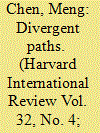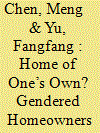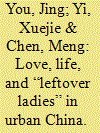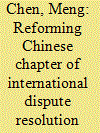| Srl | Item |
| 1 |
ID:
105587


|
|
|
| 2 |
ID:
174413


|
|
|
|
|
| Summary/Abstract |
This article contributes to the existing literature on housing inequality in China with new empirical evidence from a gender perspective. Using four rounds of data from the Chinese General Social Survey and adopting individuals as the unit of analysis, the study explores gender disparity in homeownership in urban China. Using binary logistic regression models, we reveal a profound gender gap in individual chance of being homeowners. While men and women may be similarly affected by several characteristics, women’s chance of owning household housing assets is more likely to be affected by factors relating to the private sphere of family life, such as family of origin, number of brothers, and changes in marital status. We emphasize that gender inequality in housing circumstances is an important part of social stratification. To gain a comprehensive understanding of the issue, researchers need to reflect upon the explicit and implicit belief in using family as the unit of analysis.
|
|
|
|
|
|
|
|
|
|
|
|
|
|
|
|
| 3 |
ID:
182759


|
|
|
|
|
| Summary/Abstract |
The population in urban China has shown rising age at first marriage and declining marriage rates, especially among college educated professional women who are in their late 20s or their 30s. We investigate the determinants of marriage formation for urban women aged 27 or above who tend to be termed “leftover ladies”. We estimate a recursive mixed-equation model to describe correlated profiles of career, education and marriage. Conventional social norms on gender, especially patriarchy, still prevail. Factors that are not favorable for a conventionally wifely role reduce women's likelihood of marriage. In particular, we reveal a “marital college-discount” of college education. It reduces the probability of marriage by 2.88%–3.6% and a postgraduate degree further oppresses it by 8.4%–10.4%. Favorable characteristics such as facial attractiveness only raises the likelihood of marriage formation for non-college educated women, while pushing up non-marriage probabilities for women with at least college degrees.
|
|
|
|
|
|
|
|
|
|
|
|
|
|
|
|
| 4 |
ID:
178749


|
|
|
|
|
| Summary/Abstract |
As an increasingly important player in the international economy, China intends to contribute more to the improvement in international dispute resolution. To achieve the Belt and Road Initiative (BRI), China is actively coordinating its legal system to present an improved Chinese chapter of the international dispute resolution regime to facilitate increasing international trade and related national policies. Escalating conflicts with the United States have strengthened China’s determination to actively participate in international dispute resolution. This article presents a complete picture of the Chinese legal international dispute resolution regime and addresses several important innovations inspired by the BRI in the Chinese legal system. This article also elaborates on the latest developments in various dispute resolution methods that could provide more efficient dispute resolution services to both domestic and foreign disputants.
|
|
|
|
|
|
|
|
|
|
|
|
|
|
|
|